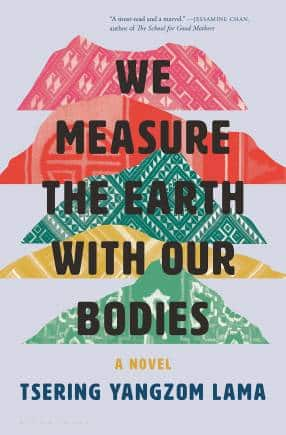



So many people have so many struggles. But the struggles of refugees will always be haunting.
The soul of Tsering Yangzom Lama’s debut novel We Measure the Earth with Our Bodies, which was shortlisted for the 2022 Scotiabank Giller Prize, probably rests in the statement, “For those of us who cannot return home, all the world is a dream.” It’s a riveting line that examines the nature of exile under the gaze of a microscope.
Lama’s narrative is rooted in the brutality of displacement. And, as a result,  hopelessness becomes a guiding force rather than a mere background tool. Home can mean different things to different people. Well, it can also be a combination of things, such as cuisines, languages, friends, and families. But what tops it all is usually the country we are attached to, either by birth or history. And history can, again, mean different things. In this novel, though, it strictly refers to the events that are related to China’s invasion of Tibet.
hopelessness becomes a guiding force rather than a mere background tool. Home can mean different things to different people. Well, it can also be a combination of things, such as cuisines, languages, friends, and families. But what tops it all is usually the country we are attached to, either by birth or history. And history can, again, mean different things. In this novel, though, it strictly refers to the events that are related to China’s invasion of Tibet.
We Measure the Earth with Our Bodies is divided into four sections in which Lama focuses on the lives of different members of a family. It begins in 1960 with Lhamo and Tenkyi (older and younger sister, respectively) losing their parents and follows their journey for around 50 years by detailing their hardships and romantic escapades. The other principal characters are Dolma (Lhamo’s daughter) and Samphel (Lhamo’s lover).
Although it looks like Lhamo occupies the central position, they are all equally important to the plot. One probably wouldn’t have existed without the other because the novel is built on the strength of their interpersonal relationships. In a conversation with Dolma, Samphel whose cynicism has hit the roof, says, “When you get to be my age, you see that the world doesn’t run on charity.” He’s a smuggler who doesn’t see any value in sanctity. He wants to take care of himself in whatever way he can. So, he doesn’t mind turning into a criminal.
He continues, “You have to get a hold of something valuable, something others want. That’s how you survive. If fortune allows you to avoid that manner of advancement, it means your ancestors took enough before your lifetime.” The worries of Dolma and Samphel aren’t the same as they belong to different generations. Even then, they both agree that their culture is valued higher than their suffering. Artifacts can easily be bought and sold, but grief doesn’t go anywhere since it cannot be put on a weighing scale.
The chapter that puts Dolma and Samphel together opens up a world of possibilities and disappointments. And it’s here that it feels as though Lama has come to a spot where she can finally relax her muscles. The two of them still carry the pain of not being able to live in Tibet, but they somehow manage to find a middle ground in their arguments.
We Measure the Earth with Our Bodies doesn’t start and end in a linear fashion. It goes back and forth in order to paint a full picture of the sisters and the rest of the characters. In Delhi, where Tenkyi goes to study, she refers to herself as a “lonely insect” as she’s far away from her community. This particular sense of alienation is a recurring theme throughout the novel. In Geetanjali Shree’s International Booker winner Tomb of Sand, too, the past horrors are never laid to rest. These works of fiction reflect the reality of trauma in prose that’s both heart-wrenching and revelatory.
Also, if you read them closely, you’ll come to know that the authors give more importance to the inner turmoil faced by their protagonists by moving wars and killings to the backseat. They seem to be more interested in gathering the scars that are passed on from one generation to the next.
Lama herself was born in Nepal and immigrated to Canada with her family when she was young. In the novel, Tenkyi moves to Canada and Dolma joins her later. In an interview with Bomb Magazine, Lama states, “Exile is a bodily experience and it’s very painful. It has real material consequences for people who are stateless. They often don’t have passports. They cannot cross certain borders. And they live in a state of longing—not only for their homeland but also for their traditions and their gods, whom they cannot access.”
Traditions and gods, apart from its characters, make Lama’s novel quite unforgettable. They appear as a secondary layer and push the story forward. So many people have so many struggles. But the struggles of refugees will always be haunting.
We Measure the Earth with Our Bodies, 2022, Bloomsbury, 368 pages, Rs 699.Discover the latest Business News, Sensex, and Nifty updates. Obtain Personal Finance insights, tax queries, and expert opinions on Moneycontrol or download the Moneycontrol App to stay updated!
Find the best of Al News in one place, specially curated for you every weekend.
Stay on top of the latest tech trends and biggest startup news.